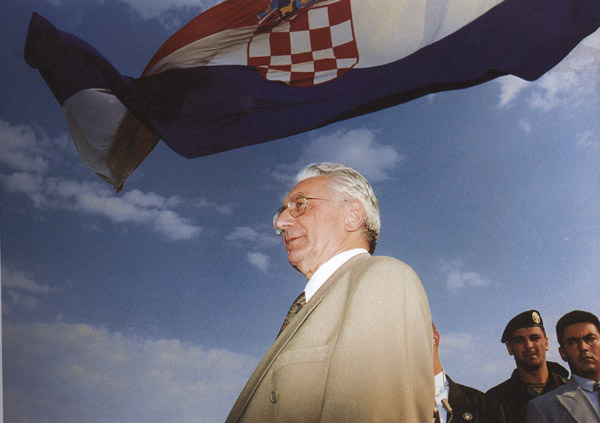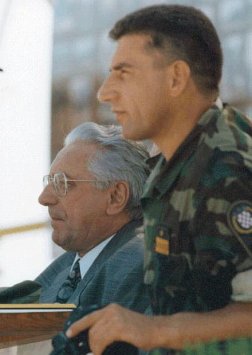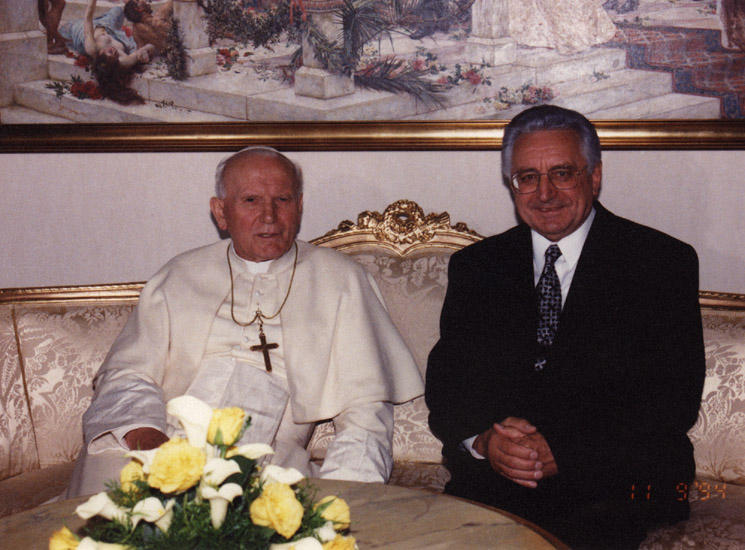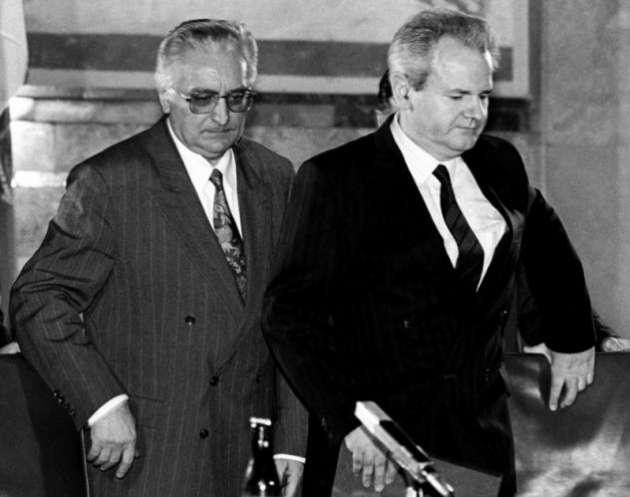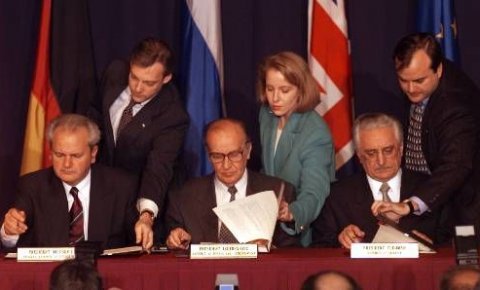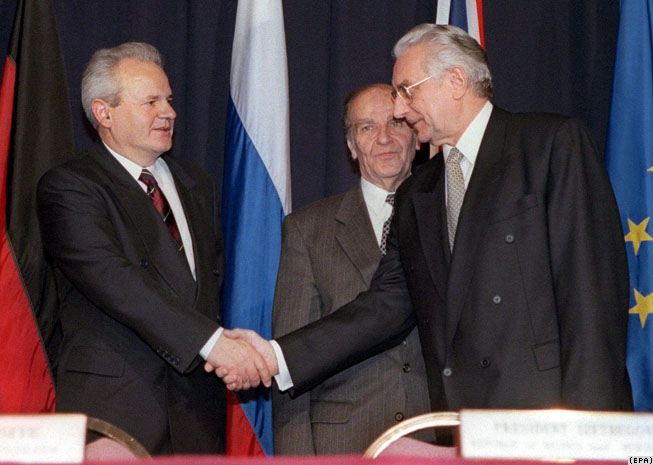<Back to Index>
- Physicist Pierre Victor Auger, 1899
- Composer Johan Peter Emilius Hartmann, 1805
- 1st President of Croatia Franjo Tuđman, 1922
PAGE SPONSOR
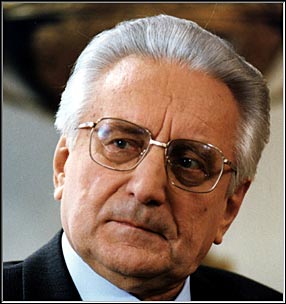
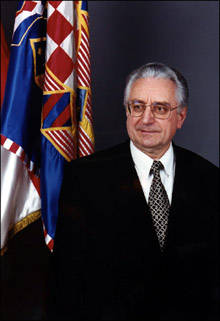
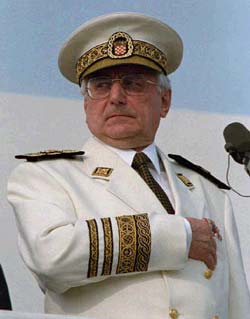
Franjo Tuđman (May 14, 1922 - December 10, 1999) was a Croatian historian, writer and politician. He was the first President of Croatia. In his youth he used to fight during ww2 in Yugoslav partisans as the yougest general in the army. After ww2 he started his work as a historian. After the conflicts during the 1960s he turned into a dissident. He had lived in relative anonymity in later years till the end of communism. He turned into politics in 1989 founding HDZ. Tuđman's political party HDZ (Hrvatska Demokratska Zajednica, Croatian Democratic Union) won the first post-communist multi-party elections in 1990 and he became the president of the country. A year later he proclaimed Croatia independent. He was reelected twice and remained in power until his death in 1999.
Franjo Tuđman was born in Veliko Trgovišće, a village in the Hrvatsko Zagorje region of northern Croatia, then a part of the Kingdom of Serbs, Croats and Slovenes. His father Stjepan owned a tavern and was an important member of the Croatian Peasant Party. When he was 7 his mother died. Stjepan
Tuđman was later re-married to Olga Milažara. From the available
description of Ankica Tuđman that marriage seemed to be happy. Franjo
Tuđman remembers that marriage as a happy one. From the viewpoint of Franjo
Tuđman Olga treated them as they were her own kids. Franjo Tuđman's mother was religious, unlike his father and step-mother. His father like Stjepan Radić had an anticlerical attitude and young Franjo adopted their attitudes. When he was 15 his father brought him to Zagreb where he met Vladko Maček, president of HSS. At first, young Franjo liked HSS, but later he turned towards communism. On November 5, 1940 he was arrested during the student demonstrations celebrating the October revolution anniversary.
On April 10, 1941, when Slavko Kvaternik proclaimed NDH, Tuđman left the school and started publishing secret newspapers with his friend Vlado Stopar. He was recruited into the Yugoslav partisans at the begining of 1942 by Marko Belinić. His father had joined the partisans and became one of founders of ZAVNOH. According to Tuđman himself his father was arrested by Ustaše and one of his brothers was taken to the concetration camp. They both managed to survive, unlike the youngest brother Stjepan, who was killed fightng on the side of the Partisans in 1943.
Tuđman was travelling between Zagreb and Zagorje using false documents in which he was identified as member of the Croatian Home Guard. At the time, he was helping to activate 1 partisan division of Zagorje. On May 11, 1940 while carrying Belinić's letter he was arrested by Ustaše but he managed to escape from the police station.
Franjo Tuđman and Ankica Žumbar were married at the city hall of Belgrade.
On April 26, 1946 his father Stjepan and stepmother were found dead. His father Stjepan killed his wife and then himself, according to the police finding. Tuđman has never managed to clarify the circumstances of their death. According to the police finding his father Stjepan killed his wife and then himself. Other theories accuse Ustaše guerrilas (Crusaders) for their death. Other sources accuse members of the Yugoslav secret police (OZNA).
Like many partisans Franjo and Ankica did not graduate secondary school. They did that after the war, in Belgrade. In 1953 Tuđman was promoted to colonel and in 1959 he became a general. He had been the youngest general in the Yugoslav army. His rise was not extreme but it was atypical for a Croat because senior officers were more and more Serbs and Montenegrins.
While attending military academy in Belgrade, one of his teachers was Dušan Bilandžić, his future advisor.
Tuđman left active army service in 1961 to found the Institut za historiju radničkoga pokreta Hrvatske ("Institute
for the History of Croatia's Workers' Movement"), and remained its
director until 1967. In three years he managed to create a major research
institution. His insisting on a Croatian interpretation of history has
turned some professors from the University of Zagreb into his enemies, like Mirjana Gross and Ljubo Boban. During his leadeship the Institute became a source of alternative interpretations of Yugoslav history.
Apart from his book on guerrilla warfare, Tuđman wrote a series of articles criticizing the Yugoslav Socialist establishment, and was subsequently expelled from the Party. His most important book from that period was Velike ideje i Mali narodi ("Great ideas and small nations"), a monograph on political history that collided with central dogmas of the Yugoslav Communist elite with regard to the interconnectedness of the national and social elements in the Yugoslav revolutionary war (during WWII).
In 1971 he was sentenced to two years of prison for subversive activities during the Croatian Spring. According to Tuđman's own testimony, Yugoslav President Marshal Josip Broz Tito personally intervened to recommend the court be lenient in his case, sparing him a far longer sentence. The authorities of SR Croatia additionally intended to prosecute Tuđman for a sentence of 15–20 years imprisonment and hard labor ("robija") on charges of espionage, which was averted by President Tito's intervention. According to Tuđman, he and Tito were personal friends.
The Croatian Spring was a national movement that was actually set in motion by Josip Broz Tito and Croatian party chairman Vladimir Bakarić in the climate of growing liberalism of the late 60s. It was initially a tepid and ideologically controlled party liberalism, but it soon grew into mass nationalist based manifestation of dissatisfaction with the position of Croatia within Yugoslavia, and threatened the party's political monopoly. As a result, the movement was suppressed by Tito, who used the military and the police to put a stop to what he saw as separatism and a threat to the party's influence. Bakarić quickly distanced himself from the Croatian Communist leadership that he himself had helped gain power earlier, and sided with the Yugoslav president. However, Tito took the protesters' demands into consideration, and in 1974 the new Yugoslav constitution granted the majority of the demands sought by the Croatian Spring. Tuđman felt that what was originally a Croatian Romantic pan-Slavic idea from the 19th century had mutated into the front for what he claimed was a pan-Serbian drive for domination over non-Serb people.
On other topics like Communism and one-party monopoly, Tuđman remained mostly within the framework of Communist ideology. His sentence was commuted by Tito's government and Tuđman was released after nine months.
Tuđman was put on trial again in 1981 for having spread "enemy propaganda", while giving an interview to the Swedish TV on the position of Croats in Yugoslavia and was sentenced to three years in prison, but again he only served a portion (this time eleven months).
On June 6, 1987 he flew to Canada with his wife Ankica in order to meet with Croatian Canadians. They
both wished to travel at that time: she was tired of the repressive
athmosphere in Zagreb at the time and he considered the Croatian diaspora to
be wealthier and more influential than it was in reality. They
were trying not to discuss "touchy" issues with emigrants beeing afraid
that some of their spectators might be agents of the Yugoslav secret police
(UDBA) which
was a common practice. At their arrival to Zagreb they were waiting for
their luggage more than an hour and after that they were questioned for
3 hourse by the local police chief.
In the latter part of the 1980s, when Yugoslavia was creeping towards its demise, torn by conflicting national aspirations, Tuđman formulated a Croatian national program that can be summarized in the following way:
- The primary goal is the establishment of the Croatian nation state; therefore all ideological disputes from the past should be thrown away. In practice, this meant strong support from anti-Communist Croatian diaspora, especially financial.
- Even though Tuđman's final goal was an independent Croatia, he was well aware of the realities of internal and foreign policy. So, his chief initial proposal was not a fully independent Croatia, but a confederal Yugoslavia with growing decentralization and democratization.
- Tuđman envisaged Croatia's future as a welfare capitalist state that will inevitably move towards central Europe and away from the Balkans.
- With regard to the burning issues of national conflicts, his vision was the following (at least at the beginning): he asserted that Serbian nationalism controlled JNA (Yugoslav People's Army: Serbs, who constituted less than 40% of Yugoslavia's population, made ca. 80% of commissioned officers corps) could wreak havoc on Croatian and Bosnian soil. The JNA, according to some estimates the fourth European military force in respect to firepower, was being rapidly Serbianized, both ideologically and ethnically, in less than four years. Tuđman's proposal was that Serbs in Croatia, who made up 12% of Croatia's population, should gain cultural with elements of territorial autonomy.
- As far as Bosnia and Herzegovina was concerned, Tuđman was more ambivalent: Tuđman did not take a separate Bosnia seriously as shown by his comments to a television crew "Bosnia was a creation of the Ottoman invasion [...] Until then it was part of Croatia, or it was a kingdom of Bosnia, but a Catholic kingdom, linked to Croatia." He thought that Bosniaks are, essentially, Croats of Muslim faith and will, freed from Communist censorship, declare themselves ethnically as Croats, therefore making Bosnia a predominantly Croatian country (with 44% Bosniaks, 17% Croats and 33% Serbs). But, these illusions were soon dispelled.
Internal tensions that had broken up the Communist party of Yugoslavia prompted the governments of federal Republics to call for the first free multiparty elections after 1945.
Tuđman's connections with the Croatian diaspora (he travelled a few times to Canada and the USA after 1987) proved to be crucial when he founded the Croatian Democratic Union ("Hrvatska demokratska zajednica" or HDZ, as it became known after its acronym) in 1989 — a party that was to stay in power until 2000, and which cannot be classified along criteria dominant in stable societies.
His first journey in 1989 was to the Theresian Military Academy in Vienna in Austria, where he received as a General from his Austro - Hungarian Army friends a public meeting organized on 5 March 1989, where he met people like Ivo Sanader, Ivan Milas and others.
Essentially, this was a nationalist Croatian movement that affirmed Croatian values based on Catholicism blended with historical and cultural traditions generally suppressed in Communist Yugoslavia. The aim was to gain national independence and to establish a Croatian nation-state. His party triumphed and got around 60% of the seats in the Croatian Parliament. After a few constitutional changes, which included his refusal to endorse the Serbs' place in the Croat constitution, inflamed Serb opinion in Croatia, resulting in many Serbs being purged from their jobs in the police, security forces, the media and factories. Tuđman was elected to the position of President of Croatia.
Since the split among Communists in Yugoslavia on a national basis was already a fact at that time (according to prevalent opinion, that was primarily Serbian leader Slobodan Milošević's responsibility), it was inevitable that the conflict should continue after the democratic elections that brought to power non-Communists in Croatia, Slovenia and Bosnia and Herzegovina, while Communists held their position in Serbia and Montenegro.
The importance of Tuđman's leadership was seen at crucial junctures of Croatia's history: the all-out war against the combined forces of Yugoslav Army and Serbian irredentist rebels, the war in Bosnia and Herzegovina, Operation Storm and the Dayton peace agreement. For instance: Tuđman's strategy of stalling the Yugoslav Army in 1991 by signing frequent cease fires intermediated by foreign diplomats was efficient — when the first cease fire was signed, the emerging Croatian Army had seven brigades; the last, twentieth cease fire the Croats had met with 64 brigades.
Unlike Serbia's President Slobodan Milošević, Tuđman managed to promote his equally rampant nationalism without attracting widespread condemnation. He achieved this by currying favour with the West by creating the impression that he was creating multi-party democracy at home. Yet, he has been accused that his domestic policy was quite undemocratic.
Even during his presidency there were circles in society who claimed that Mr Tuđman's rule was autocratic and that he showed little sensitivity to criticism. In particular, these circles consider that during the Tuđman era the civil rights record towards the minority Serb population was poor. In 2001 a review from the IPI reported about an increased number of libel law suits that were initiated during Tuđman's mandate.
The
most common accusation is that of autocratic behavior and despotism.
However, many argue that, faced with a superior military aggressor, the
Croats, who had not yet built functioning national institutions, had to
rely on a strong personal leadership Tuđman embodied. Although such
kind of leadership necessarily involved unpleasant side-effects like
traits of autocratic behavior, it might have been beneficial in crucial
matters, as the Croats under Tuđman won the war and founded the
nation state, at least partly thanks to this characteristic.
Alleged secret discussions between Franjo Tuđman and Slobodan Milošević on the division of Bosnia and Herzegovina between Serbia and Croatia were held as early as March 1991 known as Karađorđevo agreement or Karađorđevo meeting. Following the declaration of independence of the Republic of Bosnia and Herzegovina, the Serbs attacked different parts of the country. The state administration of Bosnia and Herzegovina effectively ceased to function having lost control over the entire territory. The Serbs wanted all lands where Serbs had a majority, eastern and western Bosnia. The Croats and their leader Franjo Tuđman also aimed at securing parts of Bosnia and Herzegovina as Croatian. The policies of the Republic of Croatia and its leader Franjo Tuđman towards Bosnia and Herzegovina were never totally transparent and always included Franjo Tuđman's ultimate aim of expanding Croatia's borders. In the Tihomir Blaškić verdict, the Trial Chamber found that "Croatia, and more specifically former President Tuđman, was hoping to partition Bosnia and exercised such a degree of control over the Bosnian Croats and especially the HVO that it is justified to speak of overall control."
Stjepan Mesić, the president of Croatia, revealed thousands of documents and audio tapes recorded by Franjo Tuđman about his plans during a case against Croat leaders from Bosnia and Herzegovina for war crimes committed against Bosniaks. The tapes reveal that Tuđman and Milosević ignored pledges to respect Bosnia's sovereignty, even after signing the Dayton accord. In one conversation Tuđman told an official: "Let's make a deal with the Serbs. Neither history nor emotion in the Balkans will permit multinationalism. We have to give up on the illusion of the last eight years... Dayton isn't working. Nobody - except diplomats and petty officials - believes in a sovereign Bosnia and the Dayton accords." In another he is heard telling a Bosnian Croat ally: "You should give no indication that we wish the three-way division of Bosnia." The tapes also reveal Tuđman's involvement in atrocities against the Bosniaks in Bosnia including the Croatian president covering up war crimes at Ahmići where more than a hundred Bosniak men, women and children were terrorised, and then shot or burned to death.
In 1997, the HDZ government undertook several programs to refurbish Tuđman's tarnished image, especially in the eyes of the West.
Tuđman, who had been thrice elected as President of Croatia, fell ill with cancer in 1993. He recovered, but his general state of health declined in 1999 and Tuđman died from an internal hemorrhage on December 10, 1999.
In 2004, six Bosnian Croats Jadranko Prlić, Bruno Stojić, Slobodan Praljak, Milivoj Petković, Valentin Corić, and Berislav Pušić were accused by the ICTY for being part of a joint criminal enterprise which included mass war crimes against the Bosniak population during the creation of ethnically pure Croatian quasi-state Herzeg-Bosnia on the territories of the internationally recognized state of Bosnia and Herzegovina. According to the indictment numerous persons participated in this joint
criminal enterprise. Each participant, by his or her acts, omissions,
practices or conduct, both individually and in concert with or through
other persons, substantially contributed to carrying out the enterprise
and accomplishing its purpose. Franjo Tuđman, among others,
participated in the joint criminal enterprise. As the indictment mentions not just the former President of the Republic of
Croatia, Franjo Tuđman, but also other key figures from the Republic of
Croatia (Gojko Šušak, former Minister of Defence, and Janko Bobetko, senior
General), the government of the Republic of Croatia in 2006, filed the
motion to be allowed to participate in the trial as the amicus curiae in
order to "assist in the interpretation of historical and political
facts and the determination of truth". The ICTY dismissed Croatia’s
motion to appear as amicus curiae in the case, concluding that "it
would not be in the interests of justice to allow a state – whose
former political and military officials are named in the indictment as
the participants in the joint criminal enterprise – to participate in
the proceedings as an amicus curiae."
It is true that Mr. Tuđman was not charged because he is dead, but alive, he would be here on the accused bench. General Bobetko, that he was alive, he would be accused of the bench. It should be borne in mind when talking about a joint criminal enterprise.—Judge Jean-Claude Antonetti
Had Tuđman lived longer, he would have been possibly brought up on war crimes charges by the UN Yugoslav war crimes tribunal in The Hague. Graham Blewitt, a senior Tribunal prosecutor, told the AFP wire service that "There would have been sufficient evidence to indict president Tuđman had he still been alive." The Tribunal's indictment of Croatian general Ante Gotovina lists Tuđman as a key participant in a "joint criminal enterprise" aimed at the "permanent removal of the Serb population from the "Krajina" region
by killing, force, fear or threat of force, persecution, forced
displacement, transfer and deportation, appropriation and destruction
of property other minority belongings & means." In 1995, Carl Bildt had suggested that Franjo Tuđman was as guilty of war crimes as the "Krajina" Serb leader Milan Martić. Bildt was declared a persona non grata by Croatia following these statements because he "lost the credibility necessary for the role of a peace mediator".
President Tuđman initiated the process of privatization and de-nationalization in Croatia. However, this was far from transparent and fully legal. The fact that the new government's legal system was inefficient and slow, as well as the wider context of the Yugoslav wars caused numerous incidents known collectively in Croatia as the "privatization robbery" (Croatian: privatizacijska pljačka). Nepotism was endemic and during this period many influential individuals with the backing of the ruling party acquired state owned property and companies at extremely low prices, afterwards selling them off piecemeal to the highest bidder for much larger sums. In the vast majority of cases this caused the bankruptcy of the (previously successful) firm, causing the unemployment of thousands of citizens, a problem Croatia still struggles with to this day.
It is also beyond doubt that not few shadowy figures who moved close to Tuđman, the centre of power in Croatian society, profited from this enormously, having amassed wealth with suspicious celerity. Although this phenomenon was common to chaotic reforms in most post communist societies (the best example being Russia with her "oligarchs"), the majority of Croats are of the opinion that Tuđman could and should have prevented at least a part of these malfeasances because nothing similar has happened to Slovenia, which had also been part of the former Yugoslavia. The most common allegations sprouting from this state is that he probably personally profited from this.
The charge of nepotism and favoritism (elitism), frequently leveled at Tuđman himself, has been resolved in 2007 when his daughter, Nevenka Tuđman,
was found guilty of corruption, but set free because too many years has
passed from the time of the crime. There are also other instances of
apparent family nepotism. His son Miroslav Tuđman occupied the position of Chief of the HIS, the Croatian secret service, during the time of his father's presidency. Franjo Tuđman is often accused of having acquired his personal property by dishonest means.
In 1989 Tuđman published his most famous work, The Horrors of War or Wastelands of Historical Reality (Bespuća povijesne zbiljnosti) in which he questioned the number of victims during World War II in Yugoslavia. It is considered by many to be a strange book - a compilation of meditations on the role of violence in world history interspersed with personal reminiscences on his squabbles with Yugoslav apparatchiks. It then slowly spirals towards the true center of his work: the attack on what he claimed was a hyperinflation of Serbian casualties in the Independent State of Croatia (NDH).
Serbian historians have claimed that the number of Serbs killed in the Jasenovac concentration camp was between 300,000 and 800,000. Many researchers such as the Israeli Yad Vashem of the center for Holocaust studies and the Simon Wiesenthal Center,
still maintain similar figures, which were also reported by German,
Italian, Croatian and partisan generals during the war. However some
Croatian historians and some other international organizations such as
the United States Holocaust Memorial Museum, and the Jasenovac museum are speaking of some 100,000 victims. That number is supported also by Croatian Jewish historiographer Ivo Goldstein. The last serious research of victim numbers before the Yugoslav wars was conducted by Croatian economist Vladimir Žerjavić and Serbian researcher Bogoljub Kočović.
59,589 victims (again of all nationalities) have been identified by
name (in a Yugoslav name list that was made in 1964). Tuđman had
estimated, relying on some earlier investigations, that the total
number of victims in the Jasenovac camp (Serbs, Jews, Gypsies, Croats,
and others) was somewhere between 30,000 and 60,000, thus in a scale
similar to the one that is currently prevalent in Croatia. These
figures are, however, considerably lower than the generally accepted
numbers, which caused ample controversy (as
if any atrocities against any ethnicity of any country on this planet
are made less horrific or more justifiable or, somehow, more excusable
if the numbers of the victims are alleged or proven lower....)
Another controversy surrounding The Horrors of War was Tuđman's disagreement with the official figures of Jews killed in concentration camps and in some parts his antisemitism. Tuđman is said to have estimated that a total of only 900,000 Jews perished in the Holocaust of the Second World War. However, this was reportedly a misinformation that caused some Croats to accuse the "New York Times" of anti-Croat bias. In his "Horrors of War", Tuđman had accepted historian Gerald Reitlinger's estimates that the number of Jewish victims during WW2 was closer to 4 million as opposed to the most quoted number of 5 to 6 million men, women and children murdered. Another frequently mentioned quotation is the claim that "the establishment of Hitler's new European order could be justified by the need to remove the Jews". Aside from the war statistics issue, Tuđman's book contained views on Jewish role in history that many readers found simplistic and profoundly biased. Tuđman based his views on the Jewish condition on the memoirs of Croatian Communist Ante Ciliga, one of the top officials, and later a renegade, of the pre-war Komintern, who described his experiences in the Jasenovac concentration camp during a year and a half of his incarceration. Ciliga's experiences, recorded in his book "Sam kroz Europu u ratu (1939 - 1945)", paint an unfavorable picture of his Jewish inmates' behavior, emphasizing their alleged clannishness, ethnocentrism and apartness. Ciliga claimed that Jews had held a privileged position in Jasenovac and actually, as Tuđman concludes, "held in their hands the inmates management of the camp up to 1944", something that was made possible by the idea that "in its origins Pavelić's party was philo-Semitic". Furthermore, Ciliga theorized that the behavior of the Jews had been determined by the more than 2000-year old tradition of extreme ethnic egoism and unscrupulousness that he claims is expressed in the Old Testament. He summarized, among other things, that "The Jews provoke envy and hatred but actually they are 'the unhappiest nation in the world', always victims of 'their own and others' ambitions', and whoever tries to show that they are themselves their own source of tragedy is ranked among the anti-Semites and the object of hatred by the Jews". However, in another part of the book, Tuđman himself did express the belief that these traits weren't unique to the Jews; while criticizing what he alleges to be aggression and atrocities in the Middle East on the part of Israel, he claimed that they arose "from historical unreasonableness and narrowness in which Jewry certainly is no exception".
The accusations of antisemitism were sometimes disputed due to Tuđman's contacts with representatives of the Jewish World Congress (Tommy Baer) and various Jewish intellectuals (Alain Finkielkraut, Philip J. Cohen). Still, it was invoked by Tuđman's opponents. During his 1990 election campaign, Tuđman notoriously said: "Since many government paid propagandists insinuate we (HDZ/CDU) are in fact agents of UDBA and KOS (Yugoslav political police), and point out that many of our founding members have Serbian and Jewish wives, I am very happy that my wife is neither Serbian nor Jewish, so they cannot question my credentials with regard to that matter."
On 22 April 1998 President Tuđman received the credentials of the first Israeli ambassador to Croatia, Natan Meron. In his speech Tuđman said, among other things: 'During the Second World War, within the quisling regime in Croatia, Holocaust crimes were also committed against members of the Jewish people. The Croatian public then, during the Second World War, and today, including the Croatian government and me personally, have condemned the crimes that the Ustaša committed not only against Jews but also against democratic Croats and even against the members of other nations in the Independent State of Croatia.'
NK Dinamo Zagreb is
a football club from Zagreb. In 1991 it was renamed into HAŠK
Građanski and in 1993 into NK Croatia Zagreb. Tuđman opposed re-naming
it to Dinamo. According to him the name Dinamo was too communist. That caused a conflict between Bad Blue Boys and club officials. Bad Blue Boys objected to Tuđman that they used to defend "Croaticity" under the same name in Communist Yugoslavia. Tuđman
had a vision of NK Croatia as a poweful European club. He was an open
supporter of it and was accused for inappropriate involvement into the
business of the club. The conflict ended when the club was renamed
again
to "Dinamo" a couple of months after Tuđman's death and HDZ's loss on parliaments elections.
Tuđman approaches history as a marxist scientist and a Croatian attorney. He always considered history as a means of forming society. For him, history was not just science. It was also personal devotion, serving the people as well as a practical and ethical guide. If Tuđman’s stature as a historian and publicist is to be evaluated, the following facts should be considered:
- his voluminous, more than 2,000 pages long, Hrvatska u monarhističkoj Jugoslaviji (English: Croatia in Monarchist Yugoslavia), has come to be assigned as a reading material concerning this period of Croatian history by many Croatian universities;
- his shorter treatises on the national question, Nacionalno pitanje u suvremenoj Europi (English: The National question in contemporary Europe) and Usudbene povijestice (English: History’s fates) are still well-regarded essays on unresolved national and ethnic disputes, self-determination and creation of nation-states in the European milieu;
- his most famous work Bespuća povijesne zbiljnosti (English: Horrors of war), is regarded, by the majority of Croatian analysts and historians, as a book of only historical importance.
The transition to a democratic state has proven slower and more problematic in Croatia than in neighbouring CEEC candidates for EU accession. Partly due to the years of war and ethnic cleansing, and the lack of any solid experience of democracy before the war, and partly due to the ruling regime of Franjo Tuđman, and his HDZ. President Tuđman, who came to power in 1990 and presented himself as the ‘hero of national resistance to Belgrade’s hegemony’, no longer enjoyed the unanimous support of the Croatian public by the end of the millennium. Signs of discontent became increasingly obvious to everyone, particularly in connection with the social problems arising from an unemployment rate variously estimated at between 18 and 20%. Croatian progress towards democracy has been marked by many failures. According to reports by the OSCE and the Helsinki International Federation for Human rights, respect for human rights in Croatia fell far short of European standards during his ruling. These reports criticise the arrangements for the return of persons displaced during the war, the reform of the electoral law and the situation with regard to the independence of the press, freedom of association, freedom of information and co-operation with the International Criminal Tribunal for the former Yugoslavia. The two organisations found that arrangements for the return of refugees discriminated against Croatian Serbs that had been obliged to flee the country during the war. The revised electoral law, while preventing the over-representation of Bosnian Croats, was not found to guarantee adequate representation of the Serb minority. The situation of the Croatian media was found to have significantly deteriorated. The annual report of the Helsinki International Federation for Human Rights reported cases of harassment and telephone bugging of journalists and pressure being brought on the independent media (e.g. the attempt to close down Radio 101). President Tuđman’s popularity declined further in the course of 1999 in the wake of revelations concerning corruption and privatisation operations which allegedly had benefited the ruling party. Given the authoritarian and corrupt nature of the ruling clique and its potentially destabilising impact on the region, analysts predicted that there would be a change in the ruling coalition immediately after the legislative elections.
Despite
the controversy, Tuđman is credited with creating the basis for an
independent Croatia, and helping the country move away from communism
and towards democracy. He is sometimes given the title "father of the
country" for his role the country's independence. His legacy is still
strong in parts of Croatia; there are schools, squares and streets in
some cities named after him, and statues have been erected. Plans to
create a square in Zagreb after the late president, proposed by his
family and supporters, encountered discontent among the citizens. Their
attempt of changing the Roosevelt or Marshal Tito Square failed, and a large square near the Ilica Street in Črnomerec, Zagreb was named after him in December 2006.
